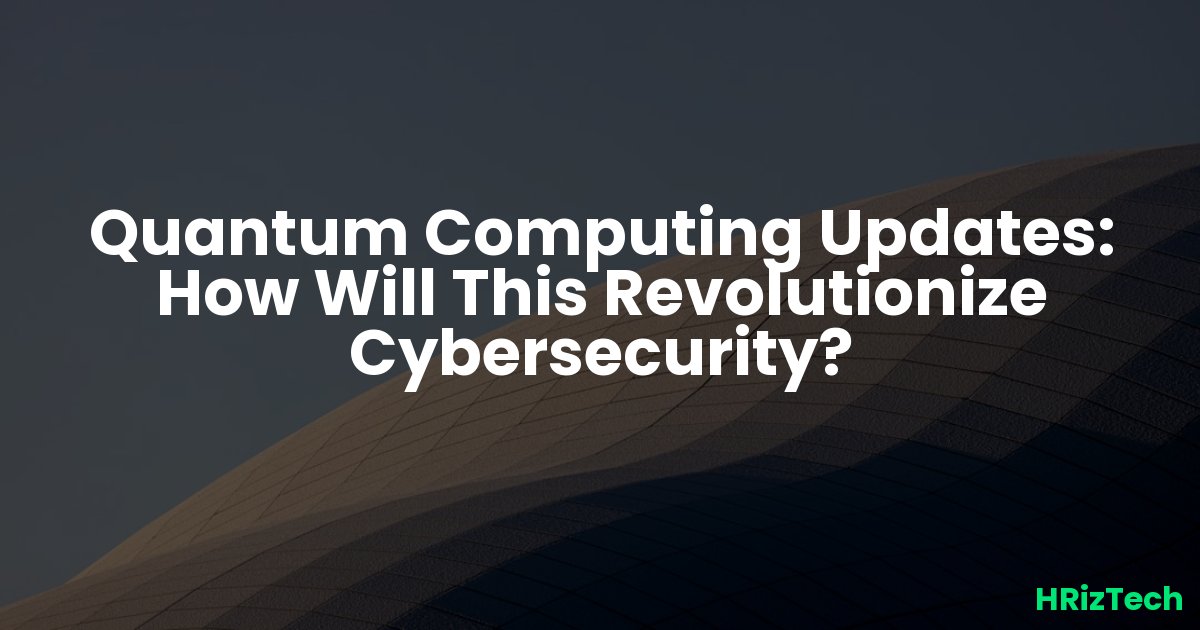Quantum Computing Updates: How Will This Revolutionize Cybersecurity?

Quantum Computing Updates: How Will This Revolutionize Cybersecurity?
Ever wondered if your super-secure passwords are truly safe? With Quantum Computing Updates rapidly advancing, that's a question increasingly worth pondering. The technology holds incredible potential, but it also presents significant cybersecurity challenges. Let's dive into the latest developments and explore how we can prepare.Understanding the Quantum Leap: What is Quantum Computing?
Traditional computers store information as bits, representing either a 0 or a 1. Quantum computers use qubits. Qubits leverage quantum mechanics, allowing them to be 0, 1, or both simultaneously (superposition). This allows for exponentially faster processing power, potentially solving problems currently intractable for even the most powerful supercomputers.
This immense power is both exciting and daunting. While it promises breakthroughs in medicine, materials science, and artificial intelligence, it also poses a serious threat to current encryption methods. Quantum Computing Updates are shaping the future in profound ways – and we must be prepared.
The Quantum Threat: Breaking Encryption
Many of our online security measures rely on public-key cryptography. These methods are based on mathematical problems extremely difficult for classical computers to solve. However, quantum computers could potentially crack these problems relatively quickly, jeopardizing sensitive data like financial transactions, medical records, and national secrets.
What does this mean for businesses?
Imagine a scenario where a competitor could easily decrypt your company's confidential data. This is the very real possibility that Quantum Computing Updates present. Businesses need to start planning for this now to avoid catastrophic breaches.
Quantum Computing Updates: The Race Towards Post-Quantum Cryptography
Recognizing the impending threat, researchers and cybersecurity experts are working hard on post-quantum cryptography (PQC). These are encryption methods designed to be resistant to attacks from both classical and quantum computers. Several promising algorithms are under development and evaluation.
How do I start preparing my organization?
The National Institute of Standards and Technology (NIST) is leading the charge, selecting and standardizing PQC algorithms. Staying updated on NIST's recommendations is crucial. Begin assessing your current cryptographic infrastructure and planning a phased migration to PQC-compliant systems. This is a significant undertaking, requiring expertise and resources.
Practical Steps for Quantum-Ready Cybersecurity
Preparing for the quantum era isn't just about switching algorithms; it's a holistic approach. Here are some key steps:
- Inventory your cryptographic assets: Identify all systems and applications relying on encryption.
- Assess your risk profile: Determine which data is most vulnerable and prioritize its protection.
- Stay informed about Quantum Computing Updates: Follow NIST and other relevant organizations for updates on PQC standards.
- Develop a migration plan: Outline a phased approach to updating your systems with PQC-ready algorithms.
- Invest in cybersecurity training: Educate your team on the implications of quantum computing and the necessary security measures.
2025 and Beyond: Quantum Computing Updates and the Future of Cybersecurity
A 2025 Gartner report predicts a significant increase in quantum computing-related cybersecurity threats. As quantum computers become more powerful, the need for robust PQC solutions will become even more critical. We can expect to see increased collaboration between government agencies, research institutions, and private companies to develop and deploy these solutions. AI advancements will also play a crucial role in detecting and mitigating quantum-based attacks.
This isn't just a problem for tech giants; it's a concern for every organization handling sensitive data. Ignoring these Quantum Computing Updates could have severe consequences. Proactive planning and investment in PQC are essential for maintaining a strong cybersecurity posture in the coming years.
Have you started assessing your organization's vulnerability to quantum computing threats? What steps are you taking to prepare?
Quantum Computing Updates are transforming the landscape of cybersecurity. While the challenges are significant, the advancements in post-quantum cryptography offer a path toward a more secure future. By proactively addressing these issues, we can mitigate the risks and harness the potential benefits of this revolutionary technology.
What’s your favorite AI tool for cybersecurity? Share below!
Comments
No comments yet. Be the first to comment!